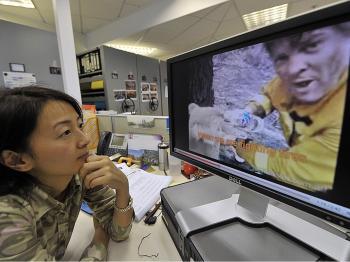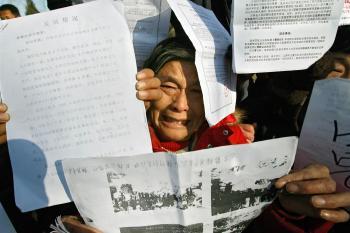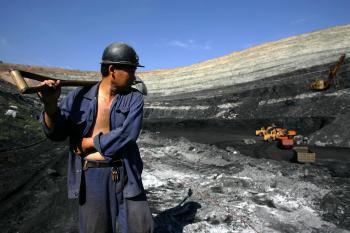At 6:00 a.m. on Nov. 13 Mrs. Tang Fuzhen, standing on the roof of her three-story house, poured bottles of gasoline on herself. An excavator was breaking her yard’s gate and wall. Meanwhile, local officials in uniform were breaking in the last blocked door to her house’s third floor, where her family, including an infant, stood together crying. She screamed in desperation: “Stop. Otherwise, I will light myself up.”
Nobody stopped. One second later, she became a ball of fire. This happened in Chongqing, a provincial capital 1270 miles south west of Beijing, because the local authorities wanted to take over the land Mrs. Tang’s house stood on to build a new road.
Mrs. Tang was rushed to a local hospital, and died sixteen days later. Meanwhile, four of her family members were also hospitalized due to the beatings they were given by local officials. Ten days later, seven other family members were arrested for “resisting a governmental order with violence.”
During Mrs. Tang’s last days in the hospital, the local authorities denied her family the chance to visit in order to prevent the news of what had happened from spreading out. Thanks to a segment of video shot by one of Mrs. Tang’s neighbors using his cell phone, the media finally learned of this incident three weeks later.
After the Chinese media reported on this story, the local authorities released an official report. According to the report, Mrs. Tang’s 17,222 square foot house was built in 1996 to use as both her residence and the site of her factory. In August 2007, when the local authorities planned to build a road across the land, Mrs. Tang’s family demanded a compensation of US$1.17 million based on the market value of the land and house.
The local authorities, however, claimed Mrs. Tang’s house was an “illegal” building because she had failed to obtain one of the necessary building permits when she built the house in 1996. Citing this reason, the authorities only agreed to compensate the family for the cost of building the house over ten years ago, which amounted to $117,000.
When negotiations reached a deadlock, the authorities first tried to evacuate the family and bulldoze the house on April 10. That attempt was stopped when Mrs. Tang threatened to self-immolate. The break-in on Nov. 13 was their second attempt. They were so determined to get the job done this time that they refused to believe Mrs. Tang really dared to set herself on fire.
Meanwhile, according to Mrs. Tang’s family, the local authorities had leased the land to them at a low price in order to induce them to invest in opening a factory in 1996. They signed with the local authorities an agreement to gain the right to use the land for building a house. The reason that they could not get one of the building permits was because of bureaucratic procedures and changes in personnel. For over ten years, the house had not been an issue for local authorities, as Mrs. Tang’s factory hired local workers and paid taxes. The building became “illegal” only when the authorities planned to build a new road.
Such incidents, with an aggrieved home owner and local officials each claiming to rights to property, have been fairly common these days in China. These situations are primarily due to two reasons: the shift of the local government’s economic interests and China’s confusing and sometimes unjujst land-ownership law.
Back in the 90s, attracting investment was the primary way for local governments to boost their local economy and tax revenue. Since real estate development was still an alien concept to most of the local officials, land was of little value to them. They frequently provided investors with long-term land-use agreements for a very low price to attract investment.
Since the beginning of this century, however, especially in the past six years of China’s housing market boom, selling land to housing and infrastructure developers became the primary source of revenue. In many places, it accounts for over 50 percent of the local government’s annual income.
In addition, each large construction project provides local officials a range of opportunities to take bribes, from signing construction contracts to issuing various permits. Finally, large construction projects are the easiest way to boost the local GDP, which is one of the most important factors used to evaluate local officials’ performance.
But with less and less land available for them to sell, the local officials have begun to regret that they had given out so much land to small investors in the 90s. As a result, they started to use China’s confusing, but generally ignored, building regulations to take the land back when necessary. Mrs. Tang’s incident is one case in this general trend.
According to Chinese law, no private land ownership is allowed. Land can only be owned by either “the county” or “a group of farmers”. Furthermore, the land owned by “a group of farmers” can be taken over by “the county” for the “public interest.”
Since local authorities are the local “representatives” of “the county,” they essentially are given the ultimate ownership of any piece of land within their authority, including the land owned by “a group of farmers.” After all, they decide what the “public interest” is.
Businesses and individuals in China can only gain the right to use a piece of land through an agreement with the local governments. In addition, different local governments require different extra permits to start construction, and the requirements change from time to time.
Confusing things further, the requirements have generally not been enforced. People sometimes get the impression that, as long as they have a connection with the local officials, they can do without some of these permits. But this loophole gives the local governments the right to revoke a land-use agreement when they want to take the land back, as in Mrs. Tang’s case.
In the past six years, conflicts over land between the people and the local officials have reached a dangerous level. Although information about these cases has been strictly censored by the Chinese regime, news of some incidents has managed to leak out via the internet. For example, recently a picture showed that a farmer, Yanhai, was cut in half by a truck wheel when he tried to stop the local government from bulldozing his house in Pingquan County, Hebei Province in 2008.
Some believe that the media coverage given Mrs. Tang’s case indicates that the central authorities wanted to use this as an example to try to curtail local officials’ fervor for taking land.
But the forces driving the seizure of land are not likely to be stopped by the reporting of Mrs. Tang’s death.
In the past decade, China’s central authorities initiated a series of tax reforms. More and more tax revenue was directed to the central government, and thus less and less was left to the local governments. This shift was justified only by an unspoken agreement that the local governments had the right to maintain, or even boost, their revenue by selling land.
When China’s regime became the state with the largest cash reserves in the world, and showed off its wealth in its lavish staging of the 2008 Beijing Olympics, local officials were motivated to transform their local cities in an attempt to catch up to Beijing’s modern style—and put some extra cash in their own wallets. With the backing of Chinese law, a tightly controlled media, and unchecked authority, Chinese local officials’ quest for wealth is unstoppable.
Mrs. Tang looked fairly beautiful in her 40s. Before she was rushed to the hospital, her last words to her family were: “I am dying. Please select my most beautiful picture to hang at my funeral.” There is no way, however, for her family to fulfill her last wish. Her house is already part of a big construction site, and no one knew where her photo album was. But one thing is for sure. A new road will appear soon, and her best pictures will be forever buried under it.
Nobody stopped. One second later, she became a ball of fire. This happened in Chongqing, a provincial capital 1270 miles south west of Beijing, because the local authorities wanted to take over the land Mrs. Tang’s house stood on to build a new road.
Mrs. Tang was rushed to a local hospital, and died sixteen days later. Meanwhile, four of her family members were also hospitalized due to the beatings they were given by local officials. Ten days later, seven other family members were arrested for “resisting a governmental order with violence.”
During Mrs. Tang’s last days in the hospital, the local authorities denied her family the chance to visit in order to prevent the news of what had happened from spreading out. Thanks to a segment of video shot by one of Mrs. Tang’s neighbors using his cell phone, the media finally learned of this incident three weeks later.
After the Chinese media reported on this story, the local authorities released an official report. According to the report, Mrs. Tang’s 17,222 square foot house was built in 1996 to use as both her residence and the site of her factory. In August 2007, when the local authorities planned to build a road across the land, Mrs. Tang’s family demanded a compensation of US$1.17 million based on the market value of the land and house.
The local authorities, however, claimed Mrs. Tang’s house was an “illegal” building because she had failed to obtain one of the necessary building permits when she built the house in 1996. Citing this reason, the authorities only agreed to compensate the family for the cost of building the house over ten years ago, which amounted to $117,000.
When negotiations reached a deadlock, the authorities first tried to evacuate the family and bulldoze the house on April 10. That attempt was stopped when Mrs. Tang threatened to self-immolate. The break-in on Nov. 13 was their second attempt. They were so determined to get the job done this time that they refused to believe Mrs. Tang really dared to set herself on fire.
Meanwhile, according to Mrs. Tang’s family, the local authorities had leased the land to them at a low price in order to induce them to invest in opening a factory in 1996. They signed with the local authorities an agreement to gain the right to use the land for building a house. The reason that they could not get one of the building permits was because of bureaucratic procedures and changes in personnel. For over ten years, the house had not been an issue for local authorities, as Mrs. Tang’s factory hired local workers and paid taxes. The building became “illegal” only when the authorities planned to build a new road.
Legally Unjust
Such incidents, with an aggrieved home owner and local officials each claiming to rights to property, have been fairly common these days in China. These situations are primarily due to two reasons: the shift of the local government’s economic interests and China’s confusing and sometimes unjujst land-ownership law.
Back in the 90s, attracting investment was the primary way for local governments to boost their local economy and tax revenue. Since real estate development was still an alien concept to most of the local officials, land was of little value to them. They frequently provided investors with long-term land-use agreements for a very low price to attract investment.
Since the beginning of this century, however, especially in the past six years of China’s housing market boom, selling land to housing and infrastructure developers became the primary source of revenue. In many places, it accounts for over 50 percent of the local government’s annual income.
In addition, each large construction project provides local officials a range of opportunities to take bribes, from signing construction contracts to issuing various permits. Finally, large construction projects are the easiest way to boost the local GDP, which is one of the most important factors used to evaluate local officials’ performance.
But with less and less land available for them to sell, the local officials have begun to regret that they had given out so much land to small investors in the 90s. As a result, they started to use China’s confusing, but generally ignored, building regulations to take the land back when necessary. Mrs. Tang’s incident is one case in this general trend.
According to Chinese law, no private land ownership is allowed. Land can only be owned by either “the county” or “a group of farmers”. Furthermore, the land owned by “a group of farmers” can be taken over by “the county” for the “public interest.”
Since local authorities are the local “representatives” of “the county,” they essentially are given the ultimate ownership of any piece of land within their authority, including the land owned by “a group of farmers.” After all, they decide what the “public interest” is.
Businesses and individuals in China can only gain the right to use a piece of land through an agreement with the local governments. In addition, different local governments require different extra permits to start construction, and the requirements change from time to time.
Confusing things further, the requirements have generally not been enforced. People sometimes get the impression that, as long as they have a connection with the local officials, they can do without some of these permits. But this loophole gives the local governments the right to revoke a land-use agreement when they want to take the land back, as in Mrs. Tang’s case.
Unstoppable Quest for Wealth
In the past six years, conflicts over land between the people and the local officials have reached a dangerous level. Although information about these cases has been strictly censored by the Chinese regime, news of some incidents has managed to leak out via the internet. For example, recently a picture showed that a farmer, Yanhai, was cut in half by a truck wheel when he tried to stop the local government from bulldozing his house in Pingquan County, Hebei Province in 2008.
Some believe that the media coverage given Mrs. Tang’s case indicates that the central authorities wanted to use this as an example to try to curtail local officials’ fervor for taking land.
But the forces driving the seizure of land are not likely to be stopped by the reporting of Mrs. Tang’s death.
In the past decade, China’s central authorities initiated a series of tax reforms. More and more tax revenue was directed to the central government, and thus less and less was left to the local governments. This shift was justified only by an unspoken agreement that the local governments had the right to maintain, or even boost, their revenue by selling land.
When China’s regime became the state with the largest cash reserves in the world, and showed off its wealth in its lavish staging of the 2008 Beijing Olympics, local officials were motivated to transform their local cities in an attempt to catch up to Beijing’s modern style—and put some extra cash in their own wallets. With the backing of Chinese law, a tightly controlled media, and unchecked authority, Chinese local officials’ quest for wealth is unstoppable.
Mrs. Tang looked fairly beautiful in her 40s. Before she was rushed to the hospital, her last words to her family were: “I am dying. Please select my most beautiful picture to hang at my funeral.” There is no way, however, for her family to fulfill her last wish. Her house is already part of a big construction site, and no one knew where her photo album was. But one thing is for sure. A new road will appear soon, and her best pictures will be forever buried under it.


